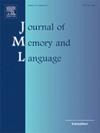Language models that match reader experience are better predictors of reading times
IF 3
1区 心理学
Q1 LINGUISTICS
引用次数: 0
Abstract
Humans differ in the language experience that they accumulate, due to differing interests, reading habits and profession. This experience can be expected to affect their linguistic expectations when reading texts from domains that are very familiar to them. The present article explores whether language models trained to match the experience of readers produce surprisal estimates that more accurately predict the reading times of those readers than the usually employed general language models. We use a German eye-tracking corpus of biology and physics students reading expository texts from these domains. We adapt a neural language model to the experience of these two groups of readers via two domain adaptation methods and varying amounts of training data. The evaluation against one early and two late reading measures suggests that aligning language models with the readers’ experience to predict the processing effort results in a better fit on late measures than using a model with a high linguistic accuracy. Our findings highlight the opportunities for exploring the cognitive plausibility of language models with respect to psychological constructs.
与读者体验相匹配的语言模型可以更好地预测阅读时间
由于不同的兴趣、阅读习惯和职业,人们积累的语言经验是不同的。在阅读他们非常熟悉的领域的文本时,这种经历可能会影响他们的语言期望。本文探讨了经过训练以匹配读者经验的语言模型是否能比通常使用的通用语言模型更准确地预测这些读者的阅读时间。我们使用德语眼动追踪语料库,用于生物学和物理学学生阅读这些领域的说明性文本。我们通过两种领域自适应方法和不同数量的训练数据,使神经语言模型适应这两组读者的经验。对一项早期和两项晚期阅读测试的评估表明,将语言模型与读者的经验结合起来预测处理努力,比使用具有高语言准确性的模型更适合晚期测试。我们的发现强调了探索语言模型在心理构念方面的认知合理性的机会。
本文章由计算机程序翻译,如有差异,请以英文原文为准。
求助全文
约1分钟内获得全文
求助全文
来源期刊
CiteScore
8.70
自引率
14.00%
发文量
49
审稿时长
12.7 weeks
期刊介绍:
Articles in the Journal of Memory and Language contribute to the formulation of scientific issues and theories in the areas of memory, language comprehension and production, and cognitive processes. Special emphasis is given to research articles that provide new theoretical insights based on a carefully laid empirical foundation. The journal generally favors articles that provide multiple experiments. In addition, significant theoretical papers without new experimental findings may be published.
The Journal of Memory and Language is a valuable tool for cognitive scientists, including psychologists, linguists, and others interested in memory and learning, language, reading, and speech.
Research Areas include:
• Topics that illuminate aspects of memory or language processing
• Linguistics
• Neuropsychology.

 求助内容:
求助内容: 应助结果提醒方式:
应助结果提醒方式:


